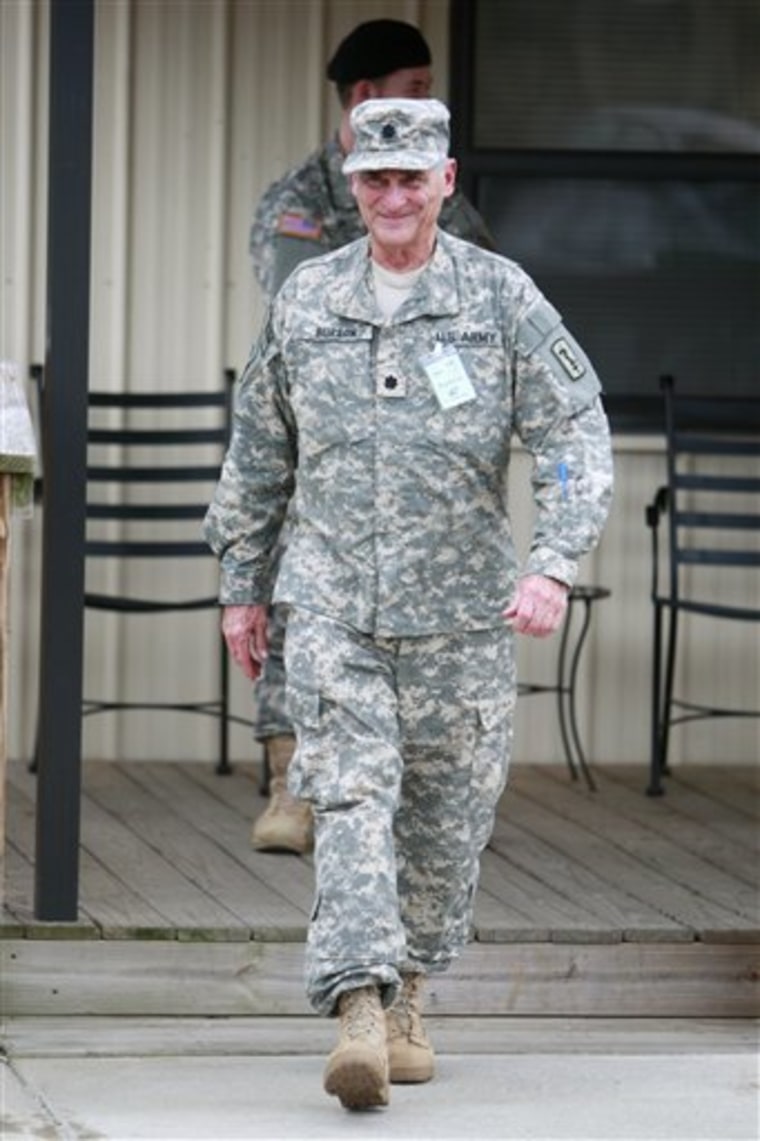Dr. John Burson balked when a skeptical Army staffer asked him to undergo a three-day physical exam to make sure he was fit to deploy as a field surgeon to Afghanistan.
"Look, I'm training to run a half-marathon," replied Burson, 74, a retired lieutenant colonel. "You come down and check to see if I can make it."
Burson won the debate and was declared fit for duty. The ear, nose and throat specialist from northwest Georgia wrapped up a weeklong training course this week at Fort Benning before his scheduled deployment Friday for a 90-day rotation with a unit of the 101st Airborne Division.
The first of two stints in Iraq proved unforgettable back in 2005, he said. Burson was among several doctors assigned to keep watch over an imprisoned Saddam Hussein.
The fallen dictator, who was three years younger than Burson, told him: "I'm glad they sent me one with gray hair this time."
Several of Burson's uncles and cousins enlisted during World War II, inspiring him to seek an Army officer's commission in the 1950s. But it would be five decades before he went to war.
By the time Burson was trained as a young officer, the Korean War was winding down. Years later, after he left active duty to join the Army Reserve, his unit was told to prepare for a tour in Vietnam. But the call never came.
Burson retired from military service in 1985 and thought he'd hung up his uniform for good. Then an e-mail came a few years ago from the Army's surgeon general, who was seeking retired military doctors to volunteer for rotations in Iraq.
'He enjoys doing it'
Burson, then 70, sent a reply asking if he was too old. The answer led to his first war tour.
"He likes to say, 'Where else can a 74-year-old go and have fun?'" said Barbara Burson, his wife of 53 years. "I don't know if I see it as fun, but he enjoys doing it. And anyone would feel good about being able to contribute."
Burson isn't the oldest service member to deploy since the U.S. went to war in Afghanistan and Iraq, but he's certainly atypical.
It's not clear how many others in their 70s have volunteered, or who's the oldest, said Wayne Hall, an Army spokesman at the Pentagon. Retired Army Reserve Col. William Bernhard, a Maryland physician, was 75 when he served in Afghanistan in 2006.
Burson keeps a steady exercise regimen, working out four to five times a week lifting weights, playing racquetball and occasionally mountain biking. Burson runs on an elliptical machine at home, which is easier on his knees. He used it to run the 12-mile half-marathon to sway the Army from requiring a new physical exam.
However, all deploying soldiers must answer questions about their overall health during a screening. Army doctors can order a physical if there are concerns, said Master Sgt. Keith O'Donnell, a spokesman for the Army's Human Resources Command.
Before his first rotation to Iraq four years ago, Burson had to pass a physical exam and the Army fitness test. Soldiers 62 and older have to do 16 push-ups and 26 sit-ups, and run 2 miles in 20 minutes. The youngest recruits must do twice as many push-ups and sit-ups, and run 2 miles in less than 16 minutes.
These days, Burson said, his preparation involves more paperwork than physical training, though he does have to go to the firing range to qualify with a 9mm handgun — the only weapon he'll carry.
"I'm not really a very good shot," Burson said. "I could probably do better throwing the pistol at a target."
'He doesn't look 74'
In Afghanistan, Burson will oversee a medical staff treating about 1,000 soldiers. He'll likely spend much of his time working in a base clinic, but could be called to treat soldiers wounded during combat patrols. When he served in Iraq, it wasn't unusual for him to work through mortar rounds being fired at his base camp.
"There's an element of risk," Burson said. "But statistically it's probably not any more hazardous than driving to work."
Lt. Col. Twanda Young said about 400 soldiers, reservists and civilian contractors go through the Fort Benning training center she commands each week, preparing to join units already overseas. Burson isn't the only gray-haired volunteer she's seen — but she said his abilities make his age irrelevant.
"He doesn't look 74," Young said. "He's very vibrant. He just wants to soldier like anybody else, which is a testament to his character."
Burson's wife said it's not surprising he wants to keep soldiering. Retiring doesn't seem to be in his blood.
Several years ago, she said, Burson planned to retire from his medical practice and turn it over to his partner. When it came time to sign the paperwork, he couldn't bring himself to do it.
Could Afghanistan be her husband's last deployment?
"We can't help but hope that," Barbara Burson said. "He doesn't make any promises."
